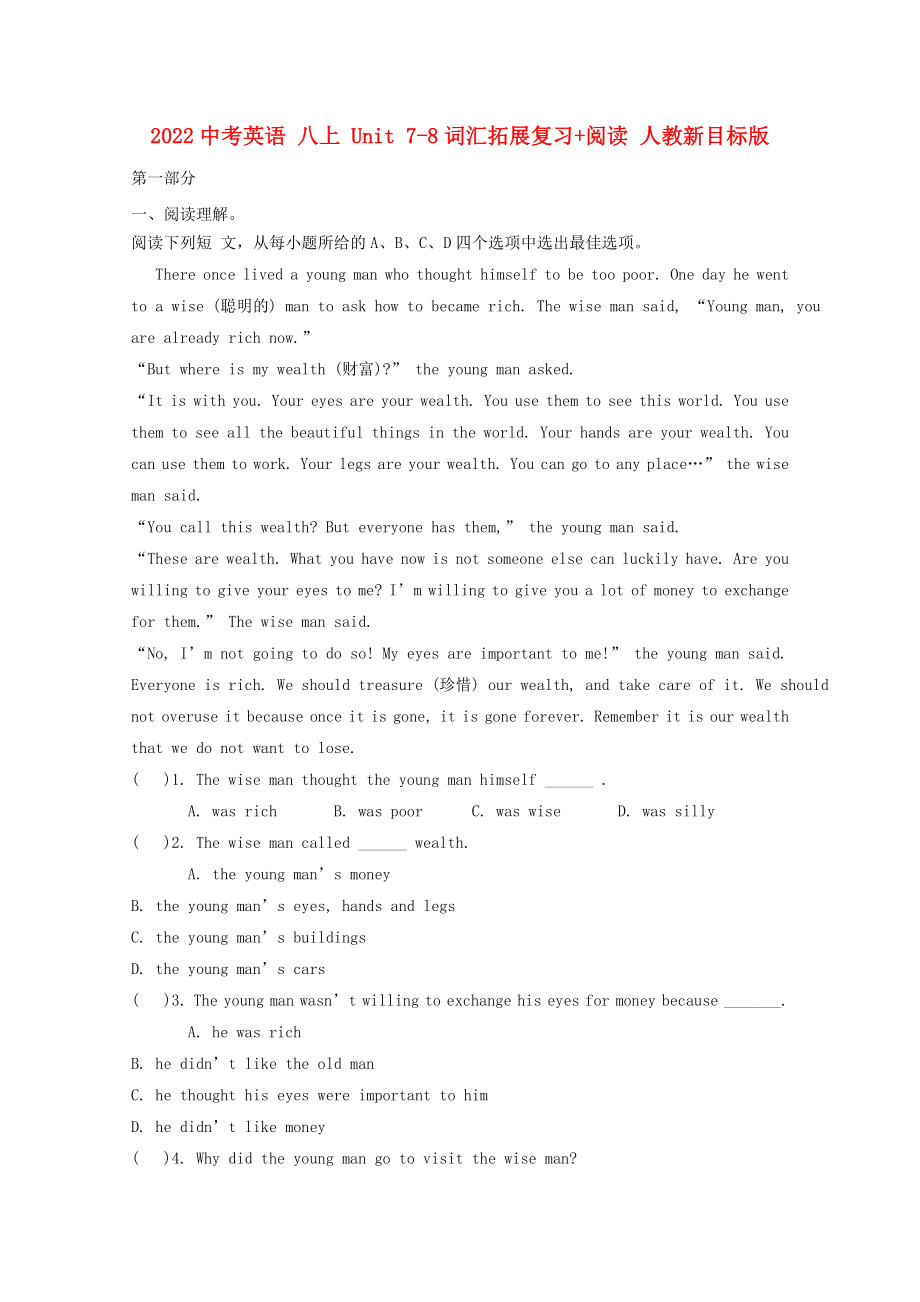《2022中考英語 八上 Unit 7-8詞匯拓展復(fù)習(xí)+閱讀 人教新目標(biāo)版》由會員分享�,可在線閱讀,更多相關(guān)《2022中考英語 八上 Unit 7-8詞匯拓展復(fù)習(xí)+閱讀 人教新目標(biāo)版(4頁珍藏版)》請?jiān)谘b配圖網(wǎng)上搜索��。
1���、2022中考英語 八上 Unit 7-8詞匯拓展復(fù)習(xí)+閱讀 人教新目標(biāo)版
第一部分
一��、閱讀理解��。
閱讀下列短 文��,從每小題所給的A����、B、C����、D四個選項(xiàng)中選出最佳選項(xiàng)。
There once lived a young man who thought himself to be too poor. One day he went to a wise (聰明的) man to ask how to became rich. The wise man said, “Young man, you are already rich now.”
“But where is my wealth
2����、(財(cái)富)?” the young man asked.
“It is with you. Your eyes are your wealth. You use them to see this world. You use them to see all the beautiful things in the world. Your hands are your wealth. You can use them to work. Your legs are your wealth. You can go to any place…” the wise man said.
“You call
3、 this wealth? But everyone has them,” the young man said.
“These are wealth. What you have now is not someone else can luckily have. Are you willing to give your eyes to me? I’m willing to give you a lot of money to exchange for them.” The wise man said.
“No, I’m not going to do so! My eyes are im
4�����、portant to me!” the young man said.
Everyone is rich. We should treasure (珍惜) our wealth, and take care of it. We should not overuse it because once it is gone, it is gone forever. Remember it is our wealth that we do not want to lose.
( )1. The wise man thought the young man himself ______ .
5����、
A. was rich B. was poor C. was wise D. was silly
( )2. The wise man called ______ wealth.
A. the young man’s money
B. the young man’s eyes, hands and legs
C. the young man’s buildings
D. the young man’s cars
( )3. The young man wasn’t
6、willing to exchange his eyes for money because _______.
A. he was rich
B. he didn’t like the old man
C. he thought his eyes were important to him
D. he didn’t like money
( )4. Why did the young man go to visit the wise man?
A. Because he wanted
7��、to know how to be rich.
B. Because he was ill.
C. Because he was the wise man’s friend.
D. Because he wanted to be wise.
( )5. Which of the following is true according to the passage?
A. We can overuse our wealth.
B. We should treasure our wealth.
C.
8���、The wise man told the young man how to make money.
D. The story is boring.
參考答案1—5��、ABCAB
二���、短文改錯���。
下面短文的畫線部分是錯誤的,請改正�����,并將其正確答案寫在短文后面相應(yīng)題號后的橫線上����。
John was a rich 1.America man. One day he went into a shop when he was spending his holiday in London. He wanted very much to buy a nice-looking watch, but
9���、 the owner of the shop asked five hundred dollars for it. Suddenly a young man came into the shop, took the watch out of the 2. owner hands and ran out with it. It all happened in a few seconds. When the owner ran out into the street, the young man was already 3. losing among the people. John went o
10�����、n. At the next corner, he saw the young man with the robbed watch in his hand.“Do you want to buy a fine watch, sir?” he asked in a low voice. “It’s only a hundred dollars.” “The young man doesn’t know I saw him 4.robbed the watch,” he thought. John paid for the watch at once and went back to his ho
11��、tel with the watch. He told his friend Bill about the fine watch. Bill took a look at the watch and started laughing. He said, “You are a fool. This watch isn’t worth even ten dollars. I’m sure the shop owner and the young man 5.planed this together.”
1.________ 2.________ 3.________ 4.________
12�����、5.________
參考答案:
1.改為 American American 意為“美國人���,美國人的”在句中作定語���。
2.改為owner’s 注意owner是單數(shù)形式,變所有格要在后面加’s���。
3.改為lost be lost 表示“走失����,走丟”����,在本句中指“消失在人群里”。
4.改為robbing 本句考查句式“see sb.doing sth.”含義是 “看見某人正在做某事”����。
5.改為planned 注意plan變過去式時(shí),要雙寫n再加-ed��。
三��、復(fù)習(xí)。(詞匯拓展)
(該部分單詞主要為動詞�、名詞或形容詞等的變形,常在單項(xiàng)填空����、完形填空和短文填空題型中進(jìn)行考查,標(biāo)★
13����、單詞的變形尤其要重點(diǎn)掌握。)
1. pollute v.污染→____________ n.污染���;污染物★
2. environment n.環(huán)境→____________ adj.生態(tài)環(huán)境的���;自然環(huán)境的;有關(guān)環(huán)境的
3. peace n.和平→____________ adj.和平的
4. danger n.危險(xiǎn)→____________ adj.有危險(xiǎn)的�����;不安全的★
5. believe v.相信�����;認(rèn)為有可能→__________(過去式/過去分詞)→__________n.相信���;信賴����;信仰
6. fall v.倒塌�����;跌倒��;掉落→____________(過去式)→_____
14�、_______(過去分詞)★
7. possible adj.可能的→____________ adv.可能;或許→____________n. 可能�����;可能性
→____________adj. 不可能存在或發(fā)生的�����;不可能的
8. probable adj.很可能的→ ____________adv.很可能���;大概
9. shake v.& n.搖動��;抖動→____________(過去式)→____________(過去分詞)
10. final adj.最終的→____________ adv.最后��;最終★
11. salt n.鹽→____________ adj.咸的
12
15�、. dig v.掘(地); 鑿(洞); 挖(土)→__________(過去式/過去分詞)→____________(現(xiàn)在分詞)
13. tradition n.傳統(tǒng)→____________adj.傳統(tǒng)的;慣例的
14. celebrate v.慶?!鷂___________ n.慶祝;慶賀★
參考答案:
1. pollution 2. environmental 3. peaceful 4. dangerous
5. believed; belief 6. fell; fallen
7. possibly; possibility; impossible 8. probably
16�、 9. shook; shaken
10. finally 11. salty 12. dug; digging 13. traditional 14. celebration
第二部分
完形填空
閱讀下面短文,掌握其大意����,然后從各題所給的A、B�、C或者D四個選項(xiàng)中選出最佳選項(xiàng)。
Everyone in our school loves 1 . We do morning exercises after we 2 . We have P.E. classes 3 a week, and we play sports at five every afterno
17�����、on. The most 4 sport is basketball. The boys enjoy playing it and many of the girls like it, too. Another popular sport is football and in every class there 5 a lot of football fans. Usually volleyball is played outside when the weather is 6 . We have school teams in basketball, football
18�����、and volleyball. Our teams often have friendship matches with teams from 7 schools.
Besides ball games, some of us like running, 8 and throwing. Every term we have tests in these events and once a year we 9 a sports meeting.
Sports help to keep us 10 and happy.
1. A. art
19����、 B. music C. sports D. painting
2. A. have dinner B. get up C. get home D. have lunch
3. A. the second B. two C. second D. twice
4. A. popular B. boring C. tiring D. difficult
5. A. is B. was
20�����、 C. are D. were
6. A. windy B. rainy C. terrible D. fine
7. A. other B. others C. another D. the other
8. A. writing B. jumping C. singing D. drawing
9. A. build B. take C. have D. make
10. A. health B. healthy C. healthier D. unhealthy
參考答案1—10、CBDAC DABCB
 2022中考英語 八上 Unit 7-8詞匯拓展復(fù)習(xí)+閱讀 人教新目標(biāo)版
2022中考英語 八上 Unit 7-8詞匯拓展復(fù)習(xí)+閱讀 人教新目標(biāo)版

